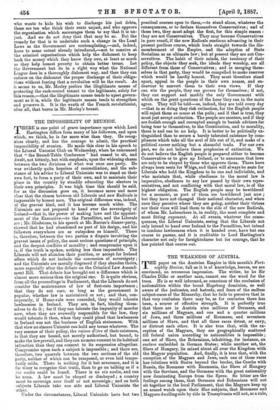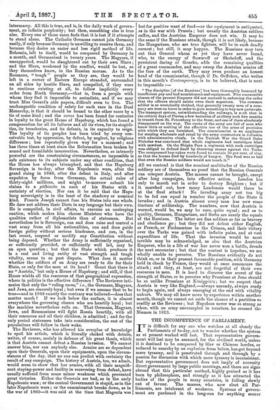THE WEAKNESS OF AUSTRIA.
THE paper on the Austrian Empire in this month's Fort- nightly Review, full as it is of knowledge, leaves, we are convinced, an erroneous impression. The writer, be he Sir • Charles Dilke or another man, cannot see the wood for the trees. He is so well informed, so conscious of the confusion of nationalities within the broad Hapsburg dominion, so well aware of the jealousies, and hatreds, and fears of the endless subject-races of the Monarchy, that he fails to perceive that in that very confusion there may be, as for centuries there has been, a source of effective strength. It is perfectly true that there are in Austria nine millions of Germans, and six millions of Magyars, and one and a quarter millions of Jews, and three millions of Roumans, and seventeen millions of Slays, and that all these races detest, or envy, or distrust each other. It is also true that, with the ex- ception of the Magyars, they are geographically scattered till federal union according to nationalities is impossible ; one set of Slays, the Bohemians, inhabiting, for instance, an enclave embedded in German States ; while another set, the Slays of Hungary, lie mixed about all over the Kingdom with the Magyar population. And, finally, it is true that, with the exception of the Magyars and Jews, each one of these races has relations with States beyond the border, the Czechs with Russia, the Roumans with Roumania, the Slays of Hungary with the Servians, and the Germans with the great nationality now dominating Europe from the Spree. So bitter are the feelings among them, that Germans and Bohemians will not sit together in the local Parliament, that the Magyars keep up an armed watch upon their Slav subjects, that Roumans and Magyars dwelling side by side in Transylvania will not, as a rule, intermarry. All this is true, and is, in the daily work of govern- ment, an infinite perplexity; but then, something else is true also. Every one of these races feels that it is lost if it attempts to stand alone. The Catholic Germans cannot join Germany easily, if only because Germany is unwilling to receive them, and because they desire an easier and less rigid method of life. Bohemia, left to itself, would be conquered by Germany in a month, and Germanised in twenty years. The Magyars, if unsupported, would be slaughtered out by their own Slays; and the Slays, weakened by the conflict, would be lost, as they themselves know, in the Russian morass. As to the Roumans, " tough " people as they are, they would be left in a corner of Eastern Europe stranded, surrounded on all sides by hostile Slays, and compelled, if they were to continue existing at all, to follow implicitly every order from North Germany,—that is, from a people with whom they find it impossible to assimilate, and if we may trust Miss Gerard's able papers, difficult even to live. The unchangeable condition of safety for each race in the Dual Monarchy, is that it should be bound to the other races by a tie of some kind ; and the nexus has been found for centuries in loyalty to the great House of Hapsburg, which has found a .e,ompensation for all its failures and all its vices, for its stupidi- ties, its treacheries, and its defeats, in its capacity to reign. The loyalty of its peoples has been tried by every con- ceivable test, by oppression, by defeat, by neglect, by religious difference ; has repeatedly given way for a moment ; and has three times at least since the Reformation been broken by armed and formidable insurrection. Nevertheless, so intensely powerful are the constraining circumstances, so impossible is safe existence to its subjects under any other condition, that the House has always triumphed, and that the Hapsburg Sovereign is to-day, after the Napoleonic wars, after the grand rising in 1848, after the defeat in Italy, and after expulsion by force from Germany, the actual ruler of thirty-eight millions, and might to-morrow submit his claims to a ple3i8eite in each of his States with a certainty of election. Nor can it be said that the Haps- burg sovereignty is in the least of the shadowy or nominal kind. Francis Joseph cannot fuse his States into one whole. He dare not address their Diets in any language but their own. He is compelled, in civil affairs, to exercise an unsleeping caution, which makes him choose Ministers who have the qualities rather of diplomatists than of statesmen. But nevertheless he is Sovereign, can and does raise and control a vast army from all his nationalities, can and does guide foreign policy without serious hindrance, and can, in the last resort, suspend or modify any Constitution without being deposed. Whether the Army is sufficiently organised, or sufficiently provided, or sufficiently well led, may be an open question ; but that the State which produces it is a real and living entity of vast strength and tough vitality, seems to us past dispute. What does it matter whether the soldiers of an Army are ready to die for their State, or only for the man at its head Grant that there is no "Austria," but only a House of Hapsburg; and still, if that House wields all the resources of that geographical expression, where in politics is the effective difference ? The Reviewer inti- mates that only the "ruling races," i.e., the Germans, Magyars, and Jews, are sincerely loyal ; but even if we assume that to be true—and in 1848 exactly the contrary was believed—does that matter much ? If we look below the surface, it is almost everywhere the governing classes who are heartily loyal ; but the machine nevertheless rolls on. That Germans, Magyars, Jews, and Roumanians will fight Russia heartily, with all their resources and all their children, is admitted ; and for the only period statesmen take into consideration, the rest of the populations will follow in their wake.
The Reviewer, who has allowed his overplus of knowledge to spoil his article, which is literally choked with details, 'writes, of course, mainly in defence of his great thesis, which is that Austria cannot defeat a Russian invasion. We cannot answer him, nor can anybody else. Armies are so dependent upon their Generals, upon their equipments, upon the circum- stances of the day, that no one can predict with certainty the result of any campaign. The history of Austria, too, we admit, would seem to show that her armies, with all their magnifi- cent staying-power and facility in recovering from defeat, have usually Buffered from some minor weakness which prevented great victories. Either the Generals are bad, as in the early Napoleonic wars ; or the central Government is stupid, as in the later Napoleonic wars ; or the commissariat breaks down, as in the war of 1860—it was said at the time that Magenta was
lost for positive want of food—or the equipment is antiquated, as in the war with Prussia ; but usually the Austrian soldiers suffer, and the Austrian Emperor does not win. It may be the same if the Russians attack, though it is not likely, bemuse the Hungarians, who are true fighters, will be in such deadly earnest ; but still, it may happen. The Russians may turn out that General whom as yet they have never found, who, to the energy of Suwaroff or Skobeleff, and the persistent daring of Gourko, adds the remaining qualities of a great commander, and may sweep the Austrian armies off the face of the earth. They may even produce an honest head of the commissariat, though if Dr. Geffcken, who writes in this month's Contemporary, is to be believed, that is next to impossible
The discipline [of the Russians] bas been thoroughly loosened by insufficient pay and bad nourishment and equipment. Five consecutive ukases of the present Emperor did not succeed in enforcing the order that the officers should saints even their superiors. Tbe common soldier is so wretchedly clothed, that generally twenty men of a com- pany are sent on leave in order to gain something to buy new garments. The transport system, notwithstanding the railways, is such that in the critical days of Plevna a few batteries of artillery took five months in transit from St. Petersburg to the front, and one of them absolutely disappeared on the way. The ranks of the army are fall of men who know little or nothing of the effective use of the arms of preoision with which they are furnished. The commissariat is an appliance for stealing wholesale and retail by the army contractors in collusion with administrative chiefs. In the Turkish War the Grand Duke Nicholas was convinced that whole regiments had cartridges filled with sawdust. On the Shipka Pass a regiment with such cartridges was obliged to defend itself by throwing stones against the Turks. The compressed hay.cakes were found to contain 50 per cent, of clay, so that the horses died by hundreds of hunger. The food was no bad that even the Russian soldiers would not touch it."
All we contend is that the nominal multitudes of the Russian soldiery are of themselves no proof that the Russian Generals can conquer Austria. The masses cannot be brought, except after long campaigns, into effective action. London has only to march out in order to destroy Brighton ; but if it marched out, how many Londoners would there be at the• final attack? No invading army not too big to be fed can equal in number the people of the State it invades ; and in Austria almost every man has now some tincture of soldiership. The numbers, now that Austria is warned, would be, we may be sure, quite equal ; and as to quality, Germans, Hungarians, and Serbs are surely the equals of the Russians. The latter are fine soldiers as far as bravery and obedience go ; but they did not defeat either English, or French, or Piedmontese in the Crimea, and their victory over the Turks was gained with infinite pains, and at vast expenditure of life. That the invasion would be most terrible may be acknowledged, as also that the Austrian Emperor, who in a life of war has never won a battle, dreads the next encounter ; but that the contest is hopeless, we are wholly unable to perceive. The Russians evidently do not think so, or in their present favourable position, with Germany held in check by France, they would at once commence the attack ; and they, at least, are not forgetful of their own resources in men. It is hard to discover the secret of the strength of States, or to perceive why Prussians at Jena should be so unlike Prussians at Kfiniggriitz ; but we suspect that Austria is very like England,—always unready, always ready to begin again, and always emerging at the end with vitality unhurt. We may all know more by experience within another month, though we cannot net aside the chance of a partition so readily as the Reviewer ; but Napoleon never was so strong as when, with an army unexampled in numbers, he crossed the Niemen in 1813.



































 Previous page
Previous page